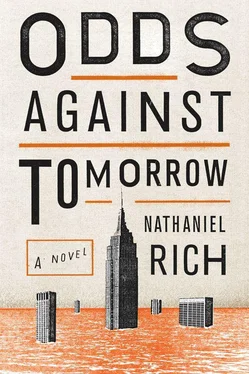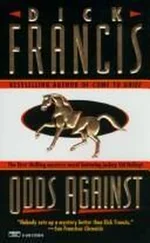“Was that beautiful?” said Mitchell. “Or horrible?”
They put on their PFDs, snatched up their oars, and resumed paddling. The fog had lifted and the air was clear, if not particularly fresh. The flooding wasn’t as severe once they got north of the park, since the elevation was higher. Harlem was empty and still. There were times when, the water depth having dropped enough that the hull began to scratch the pavement, they had to get out of the canoe and walk alongside it for a block or two, but they never ran aground. Their voyage had settled into a routine; there were no imminent threats to their safety and yet the spookiness never entirely dissipated. The cloudless sky seemed a kind of madness after the storm. But it wasn’t until they got to 135th Street that he realized what was unsettling him.
Déjà vu. Of course he’d never seen before anything like a flooded city. But now the blueness of sky, the bright cobalt blueness … He stared at the place where the buildings touched the still floodwater. It was difficult to tell exactly at what point the buildings stopped and their reflections began. The buildings might have continued forever in either direction.
It was his skycity. In his dreams what he had thought to be an infinite city, floating in space, was in fact a flooded New York. The sun was unusually bright because it bounced off the glassy surface of the water. If he fell from his tower, as in his dreams he often feared, he wouldn’t plunge forever, like Alice in the rabbit hole. He’d splash into the water. Maybe the reason the sky was so blue was because the rains had ended. All the filth of the world — its parasites and disease and wormlike anxieties — had been wiped away, just like the bacterial sludge on his living room window. His skycity had been rinsed by the flood. And what a glorious place it was.
7.
He was in no kind of physical shape, but as the day had progressed, he felt stronger. He looked forward to the challenge of crossing the Hudson — a true test of his sternman prowess. He began estimating the velocity of the Hudson’s current, the angle at which he should direct the Pyscho Canoe, the distance between the shores.
But he never had the opportunity. As they turned onto Fort Washington Avenue, Jane gave a celebratory whoop, startling him from his calculations. Amid aid tents and portable toilets, a crowd of flood refugees stood around the edge of Bennett Park. They regarded Mitchell’s canoe perplexedly but quickly lost interest. After all they’d seen in the past twenty-four hours, what was a tie-dyed canoe?
An aid worker ran to meet them, taking pulses and checking temperatures before they could even step out of the boat. As soon as they were on solid ground Jane pushed past the worker and jumped into Mitchell’s surprised arms.
She kissed him greasily on the cheek, then withdrew so she could look him in the eye. “That was courageous. You’re the best sternman a bowwoman could ever hope for.”
Mitchell hugged her back. From spending all day in the canoe, he was uneasy on his feet. He clung to her like an invalid. He shut his eyes tight, and when he opened them, everything was blurry. For a moment he felt as if the canoe had capsized and they were now sinking underwater.
There was nothing to do with the Psycho but abandon it. He dragged it under a tree and turned it upside down, leaving the paddles and orange PFDs beneath it so that someone else in need could use it. Then he walked away. He wasn’t sad to leave the Psycho behind. In fact he hoped never to see it again for the rest of his life.
A makeshift terminal had been established beneath the George Washington Bridge. Shell-shocked refugees were ferried across the river to New Jersey, where a shuttle ran them to Fort Lee High School. From there government-commandeered buses left every few hours, headed across the country in all directions: Los Angeles, San Francisco, Miami, Houston, and Portland, Maine. The country’s second cities were preparing to receive the humbled New Yorkers.
In the mobbed gymnasium of Fort Lee High School Mitchell and Jane registered at an information desk and filled out Red Cross questionnaires. Mitchell wrote down the locations of Ned Nybuster, the wailing man, and the woman with the infant. They were given water bottles and cheese sandwiches and told to find a place on the floor. After seeing next to no one all day in the abandoned city, it was overwhelming to smell, hear, and see so many people packed into a single room. Laughter, bawling, manic ranting, furtive mumbles, and the now-familiar scent of dried sewage water, obscene body odor, urine, old sweat — too much too soon.
“You going to Kansas City?” said Jane.
He honestly hadn’t thought about it. “We’d be on the same bus, right? Are you going back to Chicago?”
“Winnetka, you mean?” She shook her head. “Here’s the thing you have to understand about my parents. I’m the first person from my high school ever to attend Princeton. Then I was accepted at Wharton and finally hired for a high-paying job at a financial firm. I earn enough that I start saving to buy my own Manhattan apartment. But every time we talk, my parents ask me when I’m going to do something with my life. Why can’t I be like my sisters — all of them married, all of them pregnant. Perpetually. Perpetually pregnant, like feral dogs in heat. Two of them are younger than me. You know what else they ask me, my parents? They ask me when I’m going to make them proud.”
“So which bus are you going to take?”
“None of them, if I can help it. I’ll wait until the water subsides. It can’t be more than a week or two, right? New York is where I always wanted to be. I don’t think that will change. The city is invincible.”
“You still believe that?”
“You’ll see. It’ll come back. You said so yourself. It always has. I don’t want to go so far away that I can’t return.”
It occurred to Mitchell that Jane might be right in the short term — New York would come back, certainly Manhattan and perhaps certain swaths of Brooklyn. But what about the long term? For the long term was now upon them. According to the scientists, these would become the presiding conditions. Over the next years and decades, things would not be as before. Things would be, for starters, a lot wetter. The floods would keep coming, more and more frequently. Soon the coastal cities would lose the will to rebuild the old seawalls and levees. No one would have to pay to hear about worst-case scenarios — they’d be living them, night and day. The future would vanish as a preoccupation; the present would consume man’s full energies. The nation’s money and power would gradually transfer to the largest inland cities. Chicago, Dallas, Atlanta — even Kansas City — ascendant. Miami, San Francisco, New Orleans, Houston: drowning. Or would the major cities retreat inland? Boston to Worcester? Los Angeles to Orange County? Invincible New York would persist, but it would be rebuilt as a canal city. Amsterdam on the Hudson. Amsterdam in the Hudson. Boats instead of cars. Canoes instead of bicycles. In a floating world, Sternman would be king.
Cell service was still out, so they took turns waiting in line to use a public phone. After nearly two hours Mitchell was finally able to call his parents. His mother gasped when she heard his voice. She was too overcome to speak so she handed the phone to Tibor.
“Mitchell! Very good. Very, very good to hear your voice. We’ve been calling your phone every second the last two days.”
“I’m OK, Dad.”
“We were worried. But then I thought to myself, you know what the Lion King says.”
“‘I laugh in the face of danger.’”
“That’s my son!”
Mitchell could hear his mother sobbing hysterically in the background.
Читать дальше












